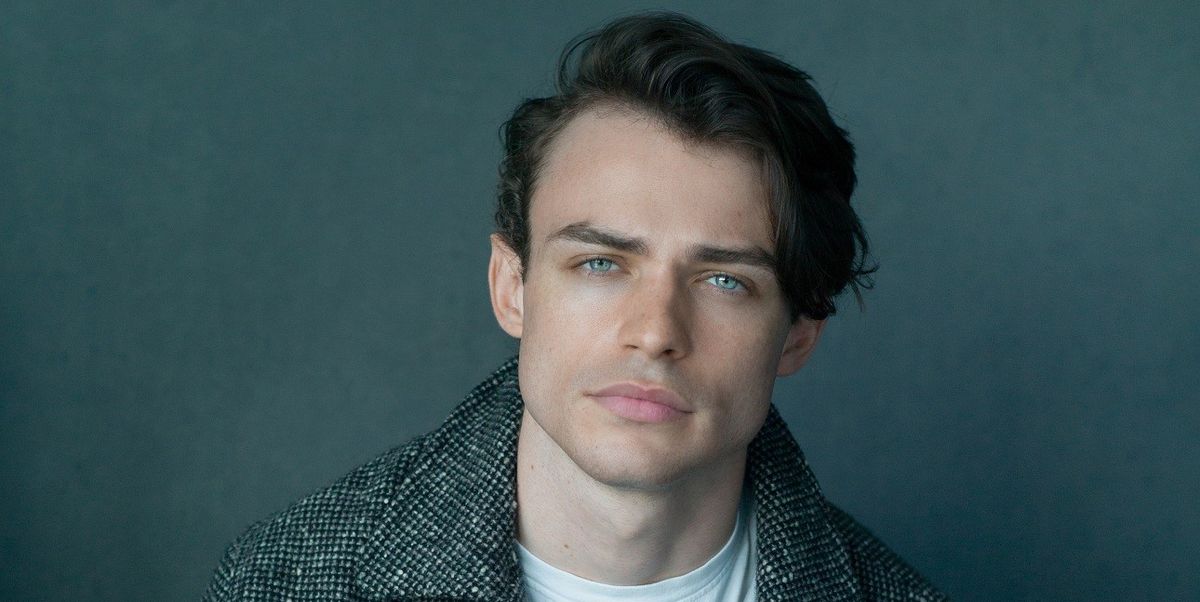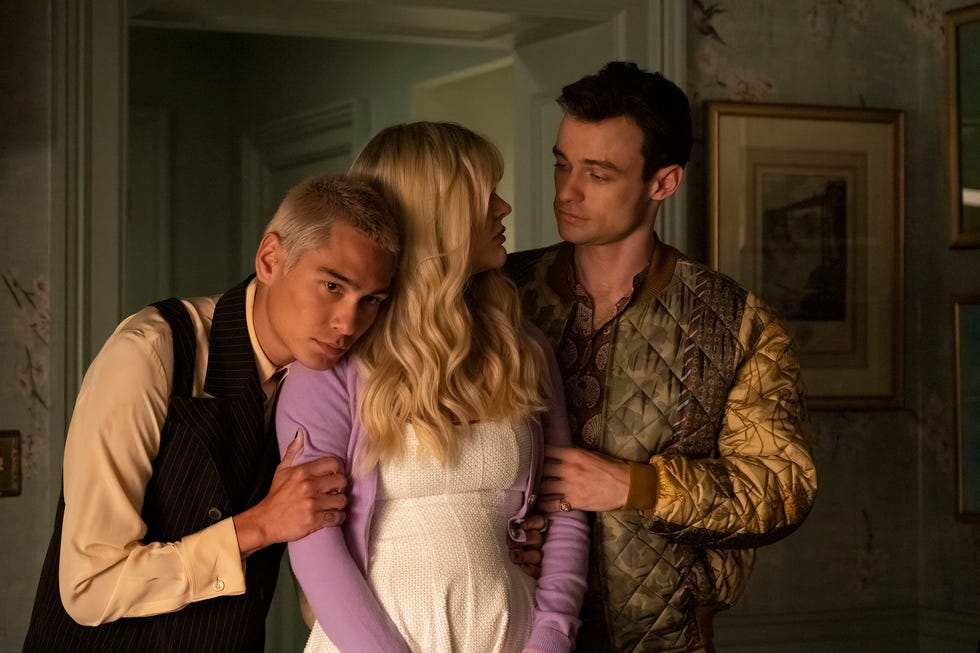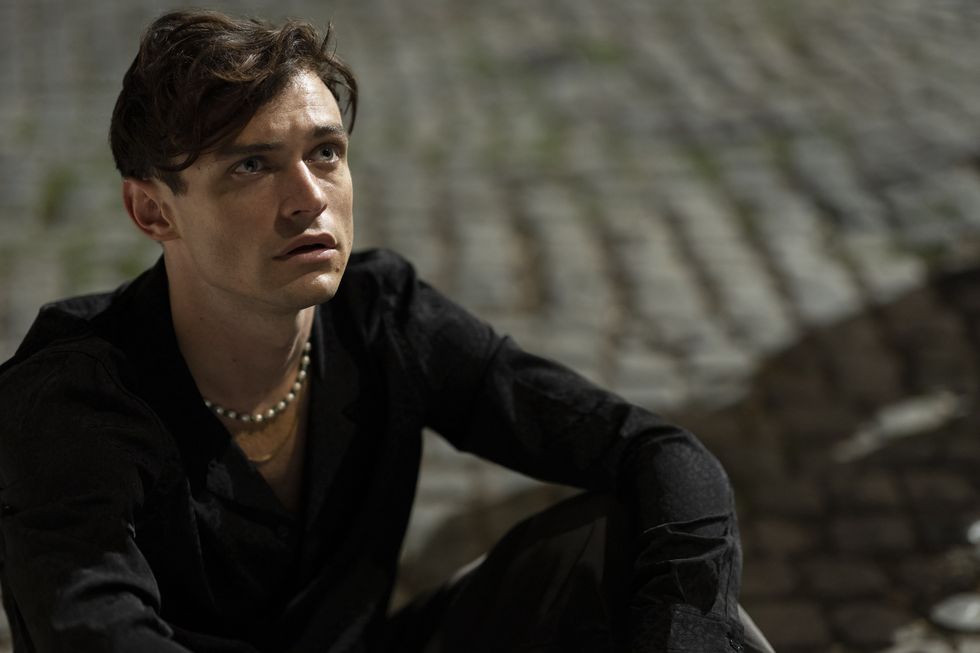Thomas Doherty has learned that nothing good lasts forever. A week after learning that HBO Max would not be renewing the Gossip Girl reboot for a third season, Doherty has only just begun to process the bittersweet end of the polarizing teen drama, just as the show was beginning to find its footing with fans and critics alike. But with his time on the Upper East Side in the rearview mirror (at least for now), the Scottish-born star remains more eager than ever to start a new chapter of his burgeoning acting career.
“For me, it’s been an amazing experience, and it’s brought me to a city that I’ve fallen in love with,” Doherty, who plays the cheeky, pansexual playboy Max Wolfe, tells ELLE.com over Zoom. “I’ve met people that I’ve fallen in love with and created a new life for myself, and [Gossip Girl] was definitely the foundation for that. I’m so grateful and happy that I was given the opportunity. I think it’s time to carry on, but you never know what is gonna happen. There might be a Gossip Girl reboot-reboot one day!”
Thursday’s season-turned-series finale finds half-sisters Julien (Jordan Alexander) and Zoya (Whitney Peak), and the rest of their eclectic group of friends, working together to unmask the brains behind Gossip Girl once and for all. They even resort to an elaborate operation at the Met Gala to lure their tormentor—who audiences have known is English teacher Kate Keller (Tavi Gevinson) all along—out of hiding. Meanwhile, Max’s throuple, or triad, is in trouble: After learning that Aki (Evan Mock) was unfaithful and Audrey (Emily Alyn Lind) worked to cover it up from him, Max, in a moment of self-destruction, hooks up again with Obie’s (Eli Brown) older sister, Heidi (Kathryn Gallagher). Ultimately, he breaks things off with Aki and Audrey after realizing they only have romantic feelings for each other.
Dressed in a cozy, blue Champion sweatshirt and calling from his apartment in New York, Doherty was charming and self-assured as he spoke about how playing Max has changed him as a person, the importance of working with intimacy coordinators, and the upcoming project that he considers his magnum opus (thus far) as an actor.
How would you describe Max’s arc in these last two seasons, and where do we find him emotionally by the end of the show?
In the first season, Max was definitely playing the character of Max—I always liked to see it like that. He had his walls up, he had his mask on and was able to hide behind a lot of different things. But then when it comes to the triad, he has to become very open and vulnerable and let all those walls and those defense mechanisms down. It’s a really scary place for someone that’s never done that before and allowed themselves to love and be loved.
So the start of the second season kicks off, and we see this new Max and then the trials and tribulations of him trying to maneuver his way through a new experience emotionally. And then as it progressed, things kept popping up and getting in his way, and he took it on the chin and just tried to get over it. But then when it comes to the end, it has become too much for him. He’s gotten himself hurt. [Being left out] is what he always feared would happen; it proved his preconceived notions correct. I think that’s a really dark, scary place. And if there was a season three, I’m sure you could see him even more walled up than what he already was initially.
Throughout season 2, Max was trying to create an environment where everyone else also felt comfortable, but he eventually discovered that three was a crowd in this specific arrangement with Aki and Audrey. What were some of the most important moments of that relationship that you wanted to play out this season from an acting perspective? What do you think was Max’s breaking point?
I’ve never been in a triad relationship. I have a friend who’s in a triad relationship, but it’s not equally split, so he’s married and he’s got a wife, but his wife has a girlfriend, and he and his wife’s girlfriend don’t really connect. It’s almost like a separate thing.
With Max, Audrey, and Aki, Max comes into an already established dynamic and relationship, so I feel like it was quite a hard thing to welcome a new person into an already existing relationship. I feel like there were red flags from the get-go, but Max really wanted it all to work, with him pretending that he wasn’t in the triad and sleeping with loads of people … and covering up all this stuff for Audrey and Aki [at the start of the season] because they weren’t ready [to come out].
And he was willing to do all of that, so that was the start of [the relationship] going a bit pear-shaped, I think, for him. He told them that he loves them, and [he’s] not having that reciprocated. He’s doing all this stuff for them, but they are still being deceitful and going behind his back. I feel sorry for the guy because he really wants this to work, and he’s putting in so much work, effort, and energy, and it’s all getting thrown back in his face. I think it was definitely a sequence or a build-up of events that kind of fucked the whole thing.
You’ve mentioned that playing out this relationship between Max, Aki, and Audrey has opened your eyes to the spectrum of sexualities and possible relationships, especially for younger generations. What were some of your own specific preconceptions about sexuality and polyamory before stepping into this role, and how has playing Max challenged those ideas and changed you as a person?
I think growing up in a country like Scotland, [where] it’s very like [motions to a clear divide down the middle with his hands] straight and gay, and that’s kind of it. And coming to America, to New York, living in this world and having that exposure to the plethora and the spectrum of different sexual orientations, genders, and all the rest of it makes you challenge your preconceived notions and the conditioning that you had growing up as a child as to how the world is, or how the world should be. It kind of obliterates that, and it made me really question my own conclusions that were not even necessarily about myself, but just conceptually. I know my own mind has definitely been liberated from that “white picket fence, man and woman, two kids and a dog” kind of mentality. I feel that’s like pumped into our brains at such a young age. It feels very, very liberating, and it brings more of a peace—I don’t quite know how to explain it. There’s definitely an acceptance, a freedom, a peace, which I really, really love.
We live in a time where there is greater acceptance for the fluidity of sexuality and gender identity, but there is also a culture of wanting actors who can authentically portray the experiences of the characters they play. You said you’ve never been in a triad, but in retrospect, were you prepared to have people ask about your own sexuality during the process of promoting this show?
The ethos I generally just live by is “live and let live.” Who is anyone to say shit about what you want to do? As long as it’s not at the detriment of other people, as long as it’s not abusive, and if you’re living honestly and being expressive as to who you truly are, I mean… fuck off. [Laughs.] No one should have that privilege—or think that they have that privilege or that right—to say who you should love or who you should sleep with.
So, I don’t really have much to say when people are like, “Oh, what’s your sexuality?” And I’m like, “Irrelevant. That doesn’t really matter.” But it has definitely opened my eyes more to the spectrum. I was always aware of it. I grew up doing musical theater, all my best friends are in the LGBTQ+ community, so I was exposed to it. But I think being forced to play and investigate a character and their life, you become a lot more [aware]—and that’s the thing I love about being an actor. You get to deep dive into a stranger, basically, and try and be that person and understand how their mind ticks and how it works. And in this case, with this topic, it was incredibly informative.
What have you learned from working with intimacy coordinators about the importance of consent and communication on professional sets?
The biggest thing that I have learned is to trust the “nos,” obviously, but also trust the “yes”es. I feel like if someone has given that consent for whatever move or position or anything like that, you have to trust the yeses, because we are living in a time where it can be quite hostile to be doing scenes like that, and you never know if someone could be triggered. If you don’t trust the yeses [of your scene partners], then you can become very closed off [as an actor], and you’re not gonna be able to be honest and represent the character and what it is you’re trying to achieve in the scene, because you’re gonna be so preoccupied with, “Can I do this? Can I do that? Well, they said yeah, but maybe…” I think it’s an incredible thing to have intimacy coordinators. I think it’s a great relationship to have on a set where you are naked and exposed and you’re doing compromising positions and camera angles and stuff. It just really creates a safe, comfortable set.
The last time we see Max in the finale is when he’s being thrown out of a bar two months after his break-up, while many of his friends are living it up in Rome. Did showrunner Joshua Safran ever tell you what the ending of the season was supposed to represent and what new parts of Max’s life you were going to explore in the future?
No, Josh has everything under lock and key. [Laughs.] So I didn’t even know what was going on. It’s hard doing TV. I love doing a film because you get a script, and you know the beginning, middle and end. TV is hard because a lot of the time, they’re still writing the last episodes. It’s not even made yet, so I’m making choices [in certain scenes], but it’s kind of like pissing into the wind. [Laughs.] I don’t know what it’s informing, so you just have to go with it. Who knows what would have happened if there was a season three? But I’m sure they would have come up with something fun.
Did you shoot any alternate endings, in the event that the show wasn’t picked up?
I’ve not seen the finale, but we didn’t do any alternative endings. What was in the script was what was done, and it’s the nature of the beast. You never know if shows are gonna get picked up [or] canceled, so you just gotta go business as usual and act as if it’s gonna go on for the next 25 years and just see what happens with that.
Looking back, what were some of your favorite scenes to shoot in these two seasons?
Honestly, all the Met step scenes. It’s just so iconic, and it’s just such a privilege and so crazy to think of myself when I was a wee boy in Scotland being part of such a culturally iconic show and moment. The Met steps represent that for me, and we did the Met gala—that was amazing. The whole thing was just fantastic, and not only the cast, but the crew and everyone behind the scenes were just lovely, lovely people.
You recently wrapped production on a movie called Dandelion with KiKi Layne, and you had to learn how to play the guitar for the role.
KiKi is an amazing actor, and she’s got an amazing voice. That was definitely the pinnacle of my acting career thus far, in terms of really just delving into a character and being fully committed to that process. I learned the guitar, grew a beard and lost about 25 pounds! That’s definitely the height of my achievements thus far, and I’ve not seen it, but just the whole experience was very real and I was so committed and invested and very passionate about it. It’s nice when you get to do work like that and you are actually really excited for the world to see it.
What sets Dandelion apart from the other projects you’ve taken on in the past?
I think because it was an indie movie. Almost everything I’ve done has become very commercialized—Gossip Girl, I’ve worked with Disney. And so this felt like one of the first opportunities, apart from doing Catherine the Great [with Helen Mirren] and High Fidelity [with Zoe Kravitz], where it was just bare bones and about the story and the acting. It was shot on film—I’ve never done that before—and it just adds this rawness to the whole experience. I spent so much time getting into this character, and I really felt like I was living that experience.
You’re at a point where you are starting to age out of playing teenagers and young adults and maybe looking to take on roles that will continue to push you creatively. What are your ultimate professional aspirations? Are you looking to get back on stage and maybe even to Broadway?
I honestly don’t really have goals; I kind of just take it as it comes. I suppose it is a goal, but I’d love to be on stage. I’d love to do theater, be it plays or musical theater, and that’s definitely my first love. But if I’m honest, I just love playing characters. A Bond villain would be so cool. [Laughs.] But I’m grateful for every opportunity and every audition, because it’s not easy out there, and I try not to set too many expectations. [I’m] trying to enjoy the ride, because at the end of the day, it’s fun and I love it, and I don’t want it to become a campaign or politicized in any way. I almost try to keep it as pure and as honest as it possibly can and should be.
Is there a dream part or musical you’re looking to do?
I’d love to play George from [Stephen Sondheim’s] Sunday in the Park With George, but that’s a few years away. [Laughs.] And James Bond!
This interview has been edited and condensed for length and clarity.
The first two seasons of Gossip Girlare now streaming in full on HBO Max.
Max Gao is a freelance entertainment and sports journalist based in Toronto. He has written for The New York Times, Los Angeles Times, NBC News, Sports Illustrated, The Daily Beast, Harper’s Bazaar, ELLE, Men’s Health, Teen Vogue and W Magazine. Follow him on Twitter: @MaxJGao.


